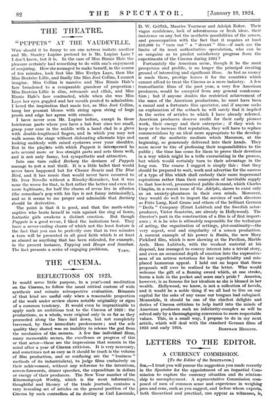THE CINEMA.
REFLECTIONS ON 1923.
IT would serve little purpose, in a year's-end meditation on the Cinema, to follow the usual critical custom of wide synthesis and minute retrospective evaluation. Resumes of that kind are useful only when a reasonable proportion of the work under review shows notable originality or signs of a common tendency. It would even be impracticable to apply such an ambitious test to the Cinema of 1925: the productions, as a whole, were original only in so far as they proceeded along the lines laid down, but not completely traversed, by their immediate predecessors ; and the sole quality they • shared was an inability to release the god from the mechanics of the camera. A few fine individual films, many memorable scenes, the excellence or progress of this or that actor—these are the impressions that remain in the mind after a year of Cinema criticism. It is very necessary, and sometimes not as easy as it should be (such is the volume of film production, and so confusing are the " business " methods of its industrialists), to judge films exclusively on their achievement, without any reference to the intentions, screen-forewords, dinner speeches, the expenditure in dollars or energy of their producers. The New Year number of the Kinematogroph Weekly, which is the most informative, thoughtful and literary of the trade journals, contains a very revealing set of articles on the general position of the Cinema by such controllers of its destiny as Carl Laemmle,
D. W. Griffith, Maurice Tourneur and Adolph Zukor. Their vague confidence, lack of adventurous or fresh ideas, their insistence on any but the aesthetic possibilities of the screen, and preoccupation with the fact that it requires at least £10,000 to " turn out " a " decent " film—if such are the limits of its most authoritative speculation, who can be so sanguine as to predict satisfactory progress from the experiments of the Cinema during 1924 ?
Fortunately the American scene, though it be the most prosperous and prolific, is no longer the principal creating ground of interesting and significant films. As fast as money is made there, prestige leaves it for the countries which cannot afford to treat the Cinema as a mere industry. A few transatlantic films of the past year, a very few American producers, would be excepted from any general condemna- tion ; but if anyone doubts the restricted achievement of the mass of the American productions, he must have been a casual and a fortunate film spectator, and if anyone seeks an explanation of the setback he will surely find it implied in the series of articles to which I have already referred. American producers deserve credit for their early pioneer work, their energy and their enterprise ; if they wish to keep or to increase that reputation, they will have to replace commercialism by an ideal more appropriate to the develop- ment of the aesthetic medium which Mammon, at the beginning, so generously delivered into their hands. They seem never to tire of professing their responsibilities to the public ; the time has come for them to prove their devotion in a way which might be a trifle excruciating in the process, but which would certainly turn to their advantage in the long run. The course I suggest is simply this : that they should be prepared to wait, work and advertise for the success of a type of film which shall embody their more impersonal aspirations rather than their conception of inevitable supply to that low-level, preconceived public demand, which Charles Chaplin, in a recent issue of the Adelphi, shows to exist only as an anxiety-phantasm in their own minds. Moreover, they would do well to import the services of such directors as Fritz Lang, Karl Grune and others of the brilliant German " Decla " Company (Ernst Lubitsch and the Swedish actor- producer, Victor Seastriim, are already in Hollywood). The director's part in the construction of a film is of first import- ance ; it is he who is ultimately responsible for the technique of acting, the organization of settings, plot-continuity—the very aspect, soul and singularity of a screen production. A current example of his power is Rosita, the new Mary Pickford film, which is now showing at the Pavilion, Marble Arch. Here Lubitsch, with the weakest material at his disposal, has managed to convey interest into a trivial story, and even an occasional depth of emotion into the expressive- ness of an actress notorious for her superficiality and mis- placed humorous appeal. I hold out no hopes that these proposals will ever be realized to the letter. Who would welcome the gift of a Aflaming sword which, at one stroke, burns a hole in the pocket and sears one's pride ? America, however, is as famous for her idealism as she is blessed in her wealth. Hollywood, we know, is not a collection of hovels, and it would be a noble thing if we all had to live on our capital for the sake of any cause our tongues had eulogized. Meanwhile, it should be one of the chiefest delights and duties of Cinema criticism to help instil into the minds of American producers such an inferiority-complex as will be solved only by a thoroughgoing conversion to more respectable values. This, in a small way, I propose to do in my next article, which will deal with the standard German films of 1923 and early 1924. BERTRAM HIGGINS.










































 Previous page
Previous page